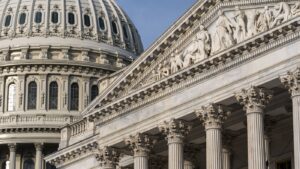
WASHINGTON (AP) — Clean energy advocates are expressing alarm over a Republican-led Senate bill that threatens to phase out tax credits for wind, solar, and other renewable energy sources. This move is part of a broader effort by President Donald Trump and GOP lawmakers to dismantle the 2022 climate law enacted under former President Joe Biden.
The proposal, which emerged over the weekend, is more drastic than anticipated. It aggressively ends incentives for clean energy and proposes new taxes on some wind and solar projects while boosting coal production for steelmaking. The Senate is poised to approve Trump’s sweeping tax break and spending cut bill, despite Democratic opposition.
Oregon Sen. Ron Wyden, the top Democrat on the Senate Finance Committee, described the GOP plan as “a death sentence for America’s wind and solar industries.” He warned that it would lead to increased utility bills and jeopardize numerous renewable energy projects designed to enhance the nation’s electric grid.
Republican Justification and Opposition
Republicans argue that the bill represents historic savings for taxpayers and supports the production of traditional fossil fuels like oil, natural gas, and coal, as well as nuclear power, thereby increasing energy reliability. Idaho Sen. Mike Crapo, chairman of the Senate Finance panel and a key architect of the bill, stated, “To achieve this record level of savings, we are slashing Biden’s Green New Deal spending and promoting America-First energy.”
Crapo further emphasized, “We stop penalizing fossil fuels in favor of unreliable and expensive green energy, and instead support consistent energy sources, making energy affordable again.” The Senate bill aims to eliminate “hundreds of billions of dollars of the Green New Deal subsidies, including ending wasteful credits like the EV tax credit.”
However, some moderate senators, such as Sen. John Curtis, R-Utah, are working to remove the new tax on wind and solar and propose other changes, though it remains uncertain if these amendments will succeed. Neil Bradley, executive vice president of the U.S. Chamber of Commerce, criticized the tax, stating, “Taxing energy production is never good policy, whether oil & gas or, in this case, renewables.”
The Impact on Renewable Energy Investment
If passed unchanged, the measure could severely impact investment in renewable energy and jeopardize hundreds of gigawatts of new power supply, which are crucial for meeting the rapidly rising electricity demand driven by data centers, artificial intelligence, and other growing uses.
Mattea Mrkusic, leading energy policy for Evergreen Action, expressed concerns that the GOP plan would “lock in higher household energy bills, kill American jobs … and torch our future.” The bill proposes cutting off climate law credits for projects not “placed in service” by the end of 2027, a timeline deemed unrealistic by many advocates.
The legislation also restricts credits for companies using components from adversaries like China and introduces a new tax on wind and solar projects that do not comply with specific supply chain rules. Princeton University Professor Jesse D. Jenkins expressed shock at the bill’s rapid end to wind and solar incentives and its proposed tax credit for metallurgical coal.
“This bill kills the industries of the future while subsidizing the industries of the 19th century. It’s insanity!” Jenkins stated on social media.
Responses from Industry Leaders
Tom Pyle, president of the conservative American Energy Alliance, praised the Senate bill as a step in the right direction. He argued, “If, as supporters of the Inflation Reduction Act are complaining, repealing these subsidies will ‘kill’ their industry, then maybe it shouldn’t exist in the first place.”
Conversely, Jason Grumet, CEO of the American Clean Power Association, criticized the bill, calling it a “midnight dumping” that would punish the fastest-growing sectors of the U.S. energy industry. Abigail Ross Hopper, president and CEO of the Solar Energy Industries Association, labeled the bill “a direct attack on American energy, American workers and American consumers.”
“Make no mistake: If this bill passes, Americans will pay the price — literally,” Hopper warned. “Power bills will rise. Factory jobs will vanish. Families will be forced to spend more just to keep the lights on and their homes cool.”
Looking Ahead
The Senate’s decision on this bill will have far-reaching implications for the future of renewable energy in the United States. As the debate continues, the outcome will likely shape the nation’s energy landscape for years to come, influencing both economic and environmental policies.
As the Senate moves forward, stakeholders from both sides of the aisle, as well as industry leaders and environmental advocates, are closely monitoring the developments, aware of the significant impact this legislation could have on America’s energy future.






